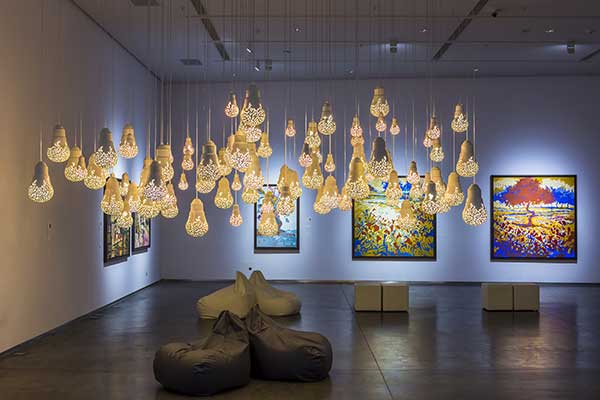 |
|
The inaugural exhibition of MOCA Yinchuan features exchanges between the East and West.[Photo provided to China Daily] |
The Yuz Museum, founded by the Chinese-Indonesian collector Budi Tek, is holding the Asian debut of its Rain Room, a popular installation of artist group Random International, and also a part of the museum's collection.
It will bring the show to Beijing next year.
Beijing's Today Art Museum will exhibit a contemporary art collection of the Renault Group in December.
Wang says Chinese private museums as a whole are still lesser known and recognized internationally when compared to their State-owned counterparts, which puts them at a disadvantage when reaching out for international cooperation.
Victoria Lu, a writer and art curator, suggests that private museums should also go deep into the roots of local culture and give more exposure to homegrown artists. They should serve as a mediation platform where their native cultures can converse with the world, she says.
Wang tells China Daily that the Long Museum will open a third branch in Chongqing next year. The city is home to the Sichuan Fine Arts Institute that cultivated several pioneers of Chinese contemporary art. She says the new establishment will bring tours of Long's exhibitions from Shanghai, and will also commit to discovering and showing local artists.
Museum administrators have also been racking their brains to make people's visits more inspiring and exciting.
The Ullens Center for Contemporary Art in Beijing's 798 Art Zone recently dedicated one room in its art store to short-duration exhibitions. It offers visitors a different approach to art besides its major shows and dynamic education program.
The special area displays artworks of medium size and within a moderate price range to cultivate potential collectors.
The highly anticipated M+ museum to be opened in Hong Kong around 2017 is also expected to set an example. Its curator Pi Li says that they would consider partly opening the museum's conservation room to the public, creating "a third space" for people to know the stories behind the artworks. They will launch a digital platform to present virtual exhibitions, release online magazines and provide social networking services.
"It is all about building a contemporary art gallery without fences," says Shih Jui-jen, director of MOCA Taipei.